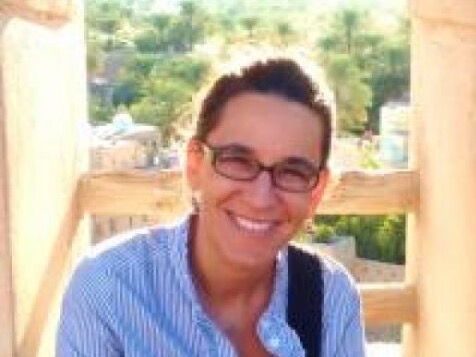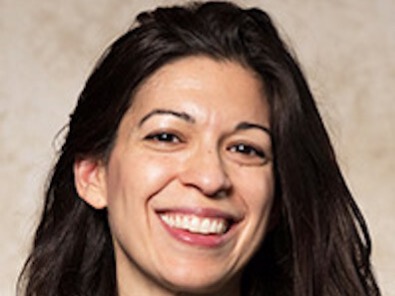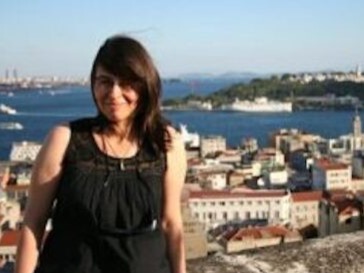Publications Editorial Board

This caption describes the image above.
Anna Ziajka Stanton is a scholar of Arabic literature and culture, world literature, and translation theory, as well as a translator of Arabic texts in multiple genres. Her first monograph The Worlding of Arabic Literature: Language, Affect, and the Ethics of Translatability (Fordham University Press, 2023) examines practices of translating Arabic literature into English that activate embodied forms of language and affective modes of reception to position Arabic literature ethically for circulation in the world literary system. The Worlding of Arabic Literature was the recipient of the ACLA Helen Tartar First Book Subvention and a Toward an Open Monograph Ecosystem (TOME) Subvention to support publication of an open-access edition. She is currently working on a new book about arboreal narratives in Arabic fiction from Lebanon, Palestine, and the Gulf region. Other recent projects include editing a special feature on Arabic literary theory for the journal PMLA (Jan. 2024) and contributing a chapter on “Translation” in the forthcoming Cambridge Companion to Modern Arabic Literature. Her translation from Arabic of Hilal Chouman’s novel Limbo Beirut was longlisted for the PEN Translation Prize and shortlisted for the Saif Ghobash Banipal Prize for Arabic Literary Translation. I have been an editor at the Journal of Arabic Literature since 2014.

This caption describes the image above.
Ben Koerber's research is concerned with Arabic language, literature, and culture from all periods, with a focus on intersections between literature and public culture in modern Egypt and Tunisia.
His first book, Conspiracy in Modern Egyptian Literature (Edinburgh University Press, 2018), examines the significance of “conspiracy theory” in works by both major and marginal Egyptian authors of the last half-century. Conspiracy theory, the book contends, operates not as a pathology in the narrow sense, but as a set of narrative tropes, interpretive frames, and aesthetic styles that structure public discourse both in literature and politics.
He is also the translator of the Arabic novel Using Life (Istikhdam al-Haya, 2014), written by Ahmed Naji and illustrated by Ayman Al Zorkany.
At present, he is researching the history of vernacular Arabic literature in Tunisia.
His creative and critical works have appeared in Akhbar al-Adab, Banipal, Jadaliyya, the Journal of Arabic Literature, Ma3azef, The New Inquiry, and Wasla.

This caption describes the image above.
Dale Correa, Ph.D. is the Middle Eastern Studies Librarian and Head of the Global Studies Team for the University of Texas Libraries, the University of Texas at Austin. She serves as the liaison to the Department and Center for Middle Eastern Studies, and to the Islamic Studies Program. She holds a Ph.D. in Middle Eastern and Islamic Studies from New York University.

This caption describes the image above.
Amy Motlagh is Bita Daryabari Presidential Chair in Persian Language and Literature and Associate Professor of Comparative Literature and Middle Eastern/South Asian Studies at the University of California, Davis. Her first book, Burying the Beloved: Realism and Reform in Modern Iran (Stanford University Press) examines how the discourses of civil law and prose fiction developed coevally and contributed to the reification of controversial gender norms in twentieth-century Iran.

This caption describes the image above.
Blake Atwood is Associate Professor of Media Studies and Chair of the Department of Sociology, Anthropology, and Media Studies at the American University of Beirut. His research and teaching focus on the intersection of technology, culture, and politics in the Middle East. Blake has published extensively on the Iranian film industry, materiality, infrastructure, and labor. He is the author of two books: Underground: The Secret Life of Videocassettes in Iran (MIT Press, 2021) and Reform Cinema in Iran: Film and Political Change in the Islamic Republic (Columbia University Press, 2016). He is currently working on a new book that studies the distribution of Iranian cinema into the American film market. Blake is also an award-winning teacher. He won the Leslie Waggener Centennial Teaching Fellowship at the University of Texas at Austin in 2017 and the Innovation in Teaching with Technology Award at AUB in 2021. Before coming to AUB, he taught at the University of Pennsylvania and the University of Texas at Austin.
required.

This caption describes the image above.
Dena Afrasiabi is the publications editor for CMES and a 2018 National Endowment for the Arts Creative Writing Fellow. She earned a B.A. in English from the University of California, Los Angeles and a Ph.D. in Middle Eastern Studies and Languages from the University of Texas at Austin. Her writing appears or is forthcoming in Michigan Quarterly Review, The Toast, Fiction Southeast and the anthology Tremors: New Fiction by Iranian American Writers (University of Arkansas Press, 2013), among others. She is also co-founding editor for the place-themed literary journal Elsewhere Lit.

This caption describes the image above.
Karen Grumberg has served as Director of the Center for Middle Eastern Studies since 2017. She works primarily on modern Hebrew literature in comparative contexts and on global and international Gothic. Her edited volume, Middle Eastern Gothics: Literature, Spectral Modernities and the Restless Past (University of Wales Press, 2022), considers literary expressions of the Gothic in the major Middle Eastern languages – Arabic, Hebrew, Persian, and Turkish. Spanning the Maghreb, the Arabian Peninsula, Iraq, Iran, Turkey, Egypt, and Palestine, the book engages with the idea of "Gothic World Literature," on the one hand by making a case for the importance of language; and on the other by proposing the transnational region – a cohesive geographic space encompassing diverse cultures, languages, and histories that parallel, intersect, or overlap – as a crucial locus of Gothic Studies. Her monograph Hebrew Gothic: History and the Poetics of Persecution (Indiana UP, 2019) examines how modern Hebrew literary texts in dialogue with the British and American Gothic tradition reorient the Jewish conceptualization of the past. Her first book, Place and Ideology in Contemporary Hebrew Literature (Syracuse UP, 2011), demonstrates how literary depictions of seemingly apolitical ordinary places invite, sustain, or subvert ideological paradigms. Dr. Grumberg co-edited a special issue on “Translational Transactions” in the Comparative Literature journal Dibur (with Corine Tachtiris, 2020) and a special issue on “Poe in the Middle East” in the journal Poe Studies (2020). Besides comparative/global gothics and space/place, her interests include: intersections of literary modernism in Norwegian and Hebrew; "juxtapositional" comparative methodologies; Hebrew translation culture; and a regional, comparatively grounded conceptualization of Hebrew within the Middle East region and in the context of multiple histories.

This caption describes the image above.
Nergis Ertürk is the author of two monographs: Writing in Red: Literature and Revolution Across Turkey and the Soviet Union (Columbia University Press, 2024) and Grammatology and Literary Modernity in Turkey (Oxford University Press, 2011), the recipient of the 2011 Modern Language Association (MLA) Prize for a First Book. Her work has also appeared in the journals PMLA, Modernism/Modernity, boundary 2, New Literary History, Interventions, Middle Eastern Literatures, Comparative Literature, Birikim, and Jadaliyya. Ertürk is a long-serving member of the editorial collective of boundary 2 and co-edited (with Özge Serin) of a special issue of the journal titled Marxism, Communism, and Translation. Her work on Writing in Red has been supported by a Social Science Research Council (SSRC) Fellowship for Transregional Research, an American Council of Learned Societies (ACLS) Charles A. Ryskamp Research Fellowship, and a residency at the Institute for Advanced Study (IAS) in Princeton.
Since 2023, Ertürk has served as the editor of the journal Comparative Literature Studies, published by the Department of Comparative Literature at Penn State. CLS reflects our departmental ethos of openness to variance in critical epistemologies and methodologies. The specific editorial projects she has curated for the journal reflect Ertürk’s commitment to grounding comparative literary studies in underrepresented minor literatures. Published and forthcoming forums on Gayatri Spivak’s Death of a Discipline and the imperatives of comparatism, on Persianate modernity, and on creolity and ajami worlds showcase groundbreaking works by senior and junior scholars that push disciplinary boundaries.
At the graduate level, Ertürk teaches courses in postcolonial studies, Cold War studies, East-East literary relations, and literary and cultural theory, including theories of gender and sexuality. Recent graduate seminars include “The Global Cold War: Translation, Aesthetics, Politics,” “Gender and Sexuality in the (Post)colony,” and “Comparative Criticism II: Romantic to Contemporary.” At the undergraduate level, she teaches courses in comparative literature with a focus on race, gender, and identity in world literature, including an introduction to comparative literature (“Reading Across Cultures”) and a capstone senior seminar on literary criticism and theory.
.

This caption describes the image above.
Adriana X. Jacobs is a poet, scholar, and translator based in Oxford, England and New York City. Her full-length translations of Hebrew poetry include Vaan Nguyen’s The Truffle Eye (Zephyr Press, 2020), winner of the 2022 Harold Morton Landon Translation Award, and Merav Givoni Hrushovski’s End— (Carrion Bloom Books, 2022).
Jacobs is the recipient of a 2015 PEN/Heim Translation Fund Grant, awarded for The Truffle Eye, and a 2020 NEA Translation Fellowship, awarded for Tahel Frosh’s Avarice(Mosad Bialik, 2014). Jacobs is the author of Strange Cocktail: Translation and the Making of Modern Hebrew Poetry (University of Michigan Press, 2018), which was a finalist for the 2019 Jordan Schnitzer Book Award, and the co-editor, with Claire Williams, of After Clarice: Reading Lispector’s Legacy in the Twenty-First Century(Legenda, 2022).
Jacobs is an associate professor of modern Hebrew literature at the University of Oxford.

This caption describes the image above.
Levi Thompson is an assistant professor in the Department of Middle Eastern Studies at the University of Texas at Austin. His research focuses on modernist literary developments outside of Europe. Levi’s first book, Reorienting Modernism in Arabic and Persian Poetry (2022), is published by Cambridge University Press and won the inaugural edition of the Modern Language Association's Aldo and Jeanne Scaglione Prize for Middle Eastern Studies.

This caption describes the image above.
Erdağ Göknar is Associate Professor of Turkish Studies in the Department of Asian and Middle Eastern Studies at Duke University and former director of the Duke Middle East Studies Center. He is a scholar of literary and cultural studies and an award-winning translator whose research focuses on the intersections of literature and politics in Turkey and the Middle East; specifically, on late Ottoman legacies in modern and contemporary Turkish fiction, historiography, and popular culture. His books include a monograph entitled Orhan Pamuk, Secularism and Blasphemy: The Politics of the Turkish Novel(Routledge, 2013); a co-edited sourcebook, Mediterranean Passages: Readings from Dido to Derrida (UNC Press, 2008); and English-language translations of Ahmet Hamdi Tanpınar’s A Mind at Peace (Archipelago Books, 2011); Orhan Pamuk’s My Name is Red (Knopf, 2001; Everyman Classics, 2010) and Atiq Rahimi’s Earth and Ashes (Harcourt, 2002; Other Press, 2010). He has written a collection of poetry, Nomadologies (Turtle Point, 2017), and co-edited Conversations with Orhan Pamuk (University Press of Mississippi, 2024). He is the recipient of two NEA Translation Fellowships. His current research project, at the intersection of law and literature, analyzes the Allied occupation of Istanbul, popular sovereignty and political violence.
